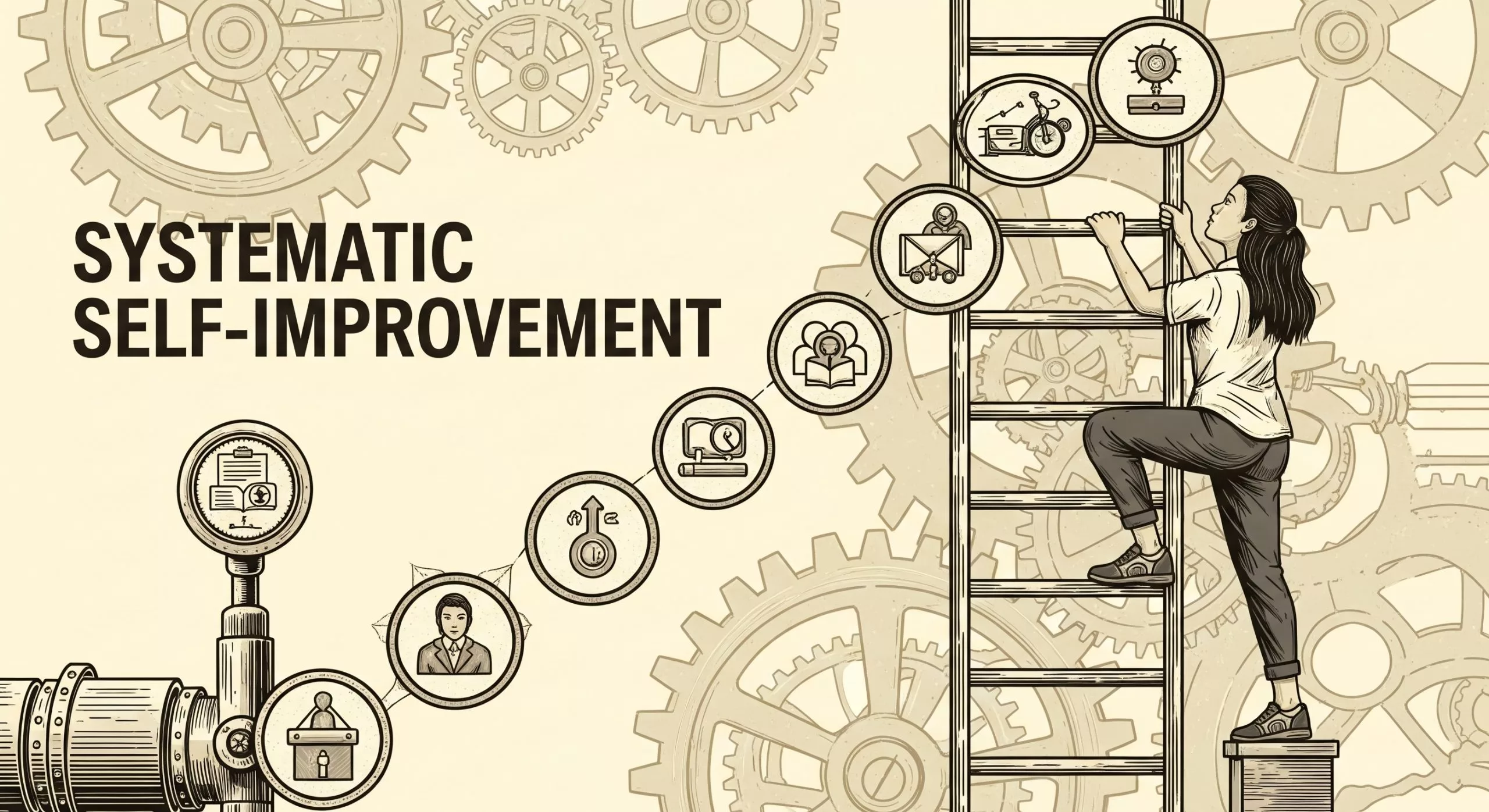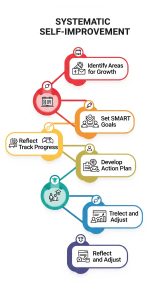Self-improvement isn’t just a side hobby anymore—it’s a must-have skill.
Random bursts of motivation or forgotten New Year’s goals won’t cut it. Real change happens when you follow a clear plan backed by science (think less Rocky montage, more Tony Stark strategy).
It’s not an overnight hack—it’s steady steps that stack up.
Stick around, and I’ll break down exactly how successful folks level up their lives, one doable step at a time.
Understanding the Psychology Behind Systematic Self-Improvement
Before jumping into the “how,” let’s talk quickly about the “why”—because your brain doesn’t like sudden changes (think Ross from Friends yelling, “Pivot!”).
Seriously, science shows we naturally resist big, dramatic shifts.
It’s called psychological reactance—basically, when you try to overhaul your life overnight, your brain pushes back, and you’re back to square one.
Instead, small consistent steps work best.
Picture it like leveling up your character in a video game—steady progress, not cheat codes.
Here’s how habits actually form (the real-life cheat sheet):
- Cue: Something triggers your brain to act (like your morning alarm).
- Routine: The action you do repeatedly (scroll Instagram, workout, coffee—your call).
- Reward: The little prize your brain gets for finishing the action (dopamine hit, anyone?).
This simple loop is the secret sauce. Once you know it, you can hack it to build habits that stick like Peter Parker to walls.
The SMART Framework for Systematic Growth
If you’re serious about leveling up, you gotta get SMART—think of it like your personal Infinity Stones for goal-setting.
SMART means your goals are Specific, Measurable, Attainable, Relevant, and Time-bound.
Here’s how it breaks down:
Specific
Don’t say stuff like “I wanna get fit”—that’s too blurry. Go for something crystal-clear, like “I’ll hit the gym 3 times a week for 30 mins.”
Basically, less Yoda-speak, more Captain America clarity.
Measurable
Track your wins. Numbers don’t lie—like your Spotify Wrapped telling you exactly how many times you streamed Taylor Swift.
Measuring your progress keeps you honest and motivated.
Attainable
Don’t aim for impossible things right off the bat (you’re not Tony Stark building Iron Man suits overnight).
Set goals you can realistically crush. Every little win boosts your confidence.
Relevant
Make sure your goals vibe with your bigger picture.
If your goal doesn’t align with your actual values or long-term vision, you’re gonna lose steam quicker than Netflix cancels shows.
Time-bound
Deadlines turn dreams into reality—no clock, no urgency.
Give yourself clear due dates, because goals without timelines are like waiting forever for Rihanna’s next album—probably never happening.
Core Principles of Systematic Self-Improvement
Alright, here’s the game plan for legit self-improvement—think of it like your personal Avengers Assemble moment.
No more winging it. Here’s how you level up step-by-step:
1. Start with self-assessment
Before you upgrade, check your current stats.
What are you great at? Where could you use some work?
Use tools like personality tests (hello, BuzzFeed quizzes on steroids), ask trusted friends for honest feedback, or journal regularly.
Spotting patterns in your wins and losses gives you cheat codes for future success.
2. Create systems, not just goals
Goals set the target, but systems get you there. Saying “I’ll write a book” is a goal.
Writing 500 words daily is a system. S
ystems are your Batcave: dependable, structured, and built for consistency—no need for overnight miracles.
3. Implement the 1% rule
Massive changes rarely stick (like New Year’s gym crowds disappearing by February).
Instead, aim to get just 1% better each day—tiny steps that snowball.
After a year, you’ll be shocked by your progress.
Think Baby Yoda’s slow but steady rise to greatness.
4. Track and measure progress
If you don’t track it, did it even happen? Keep tabs on your growth:
- Apps: Habit trackers that celebrate your streaks.
- Journals: Quick notes of daily wins and struggles.
- Dashboards: Visual charts that make your progress feel real.
- Regular check-ins: Weekly or monthly reviews to tweak your game plan.
Treat self-improvement like your favorite Netflix series—stay consistent, track your progress, and before you know it, you’ll hit your season finale goals.
Evidence-Based Techniques for Systematic Self-Improvement
Alright, time for the good stuff—here’s the ultimate blueprint for hacking your habits and leveling up your life.
Think of this like your personal habit-building cheat code straight from Hogwarts:
The 4 laws of behavior change
Based on research in behavioral psychology, these four laws provide a framework for building good habits and breaking bad ones:
Make it obvious
Set your environment up to win.
Place visual cues everywhere (sticky notes, vision boards, reminders on your phone).
Use clear intentions like, “I’ll meditate at 7 am in my bedroom.” No ambiguity—just clear, magic-map-style instructions.
Make it attractive
Pair new habits with something fun you already love.
Listen to your favorite podcast while exercising, or join groups that make your goal the cool thing to do.
Think of it as habit-building meets Netflix recommendations—you keep coming back because you enjoy it.
Make it easy
Start tiny—ridiculously tiny. Your new habit should take less than two minutes at first.
If your goal is reading more, start by opening a book and reading just one page.
Seriously, keep it short like a TikTok clip. Less friction, more wins.
Make it satisfying
Celebrate your wins immediately (post-workout selfie, anyone?).
Use apps or habit trackers to see your streaks visually—it’s the same dopamine hit as seeing your Insta likes climb. And buddy up for accountability, because no one wants to ghost their friend.
The power of keystone habits
Certain habits level-up your entire life—like the Infinity Stones of self-improvement.
Nail these, and everything else gets easier:
- Exercise: Boosts mood, energy, and brain power.
- Sleep Schedule: Keeps your brain sharp and emotions balanced.
- Daily Planning: Cuts decision fatigue (less Steve Rogers, more Captain America).
- Meditation: Lowers stress and raises your Jedi-level self-awareness.
Implementation strategies
Week 1-2: Foundation building
- Pick ONE keystone habit.
- Set your space with obvious cues.
- Track daily—expect some early-episode obstacles and figure out how to handle them.
Week 3-4: Consistency development
- Keep at it daily, adjusting if needed.
- Link the habit to your existing routine (habit-stacking, like brushing teeth + meditation).
- Celebrate even small wins. Every habit is built on tiny victories.
Week 5-8: Habit strengthening
- Stay consistent; up the challenge if it’s getting easy.
- Feeling solid? Start adding a second habit.
- Notice positive side-effects spilling into other areas (hello, crossover episodes).
Week 9-12: Integration and expansion
- Review how the habit’s working. Adjust as needed.
- Maybe add related habits (spin-offs, anyone?).
- Share your progress—post it, tweet it, text friends. Accountability is your season renewal.
Overcoming Common Obstacles
Okay, let’s talk obstacles—because even superheroes have off days.
Here’s how you beat the common villains in your self-improvement story:
Perfectionism paralysis
Stop waiting for the “perfect” plan. Just like Elsa learned, sometimes you gotta let it go.
Done beats perfect every time. Start messy, adjust as you go.
Remember, Iron Man’s first suit wasn’t exactly sleek—it got better after some test flights.
Motivation fluctuations
Motivation isn’t reliable—it comes and goes faster than your favorite TikTok trends.
So, build routines that work even when your motivation tanks.
Like Ted Lasso says, rely on the process, not just your feelings. Set things up so good habits happen automatically.
Social resistance
Not everyone will get your journey.
Some people in your life might pull a Chandler Bing—making jokes or resisting your growth because change makes them uncomfortable.
Prepare by:
- Clearly explaining why your goals matter.
- Finding communities that support your glow-up.
- Staying true to yourself, even if others aren’t on board yet.
Plateau periods
Progress won’t always feel epic. Sometimes you’ll hit a plateau, and it’ll seem like nothing’s moving.
But remember Mr. Miyagi’s lessons: Wax on, wax off.
Those moments when it seems you’re stuck usually mean you’re prepping for your next breakthrough. To handle plateaus:
- Keep showing up daily (wax on, wax off!).
- Try small tweaks to mix things up.
- Get feedback from a coach or mentor—think of them as your personal Obi-Wan.
- Remind yourself that even hidden progress counts. Every karate master has slow days before the big fight.
Advanced Systematic Self-Improvement Strategies
Ready for some advanced habit hacks? Time to go full Jedi master mode.
Here’s the pro-level breakdown to upgrade your life—like Tony Stark tweaking his Iron Man suits:
The compound effect in action
Small daily actions stack up big-time.
Just 30 mins of reading daily equals over 180 hours a year—basically a full month of studying without even trying.
It’s like casually grinding XP every day until you’re suddenly leveled up.
Strategic habit stacking
Once you nail your core habits, stack new ones onto things you already do. Like:
- “After I pour my coffee (habit locked-in), I’ll journal for 5 mins.”
- “After I sit down for lunch (easy habit), I’ll quickly list three things I’m grateful for.”
Stack habits the same way Netflix auto-plays your next episode—automatic, easy, no effort.
The 90-day intensive method
Science says around 90 days is perfect for serious habit building.
Think of it as your personal Rocky montage:
- Pick 2-3 habits that go together.
- Track your progress every day for 90 days.
- Adjust weekly based on what’s working (or not).
- Celebrate at the finish line—run those museum steps, figuratively speaking.
Environmental design
Your space shapes your habits. Design your environment to make success automatic:
- Remove temptations (ditch the candy bowl, Tony Stark-style clear distractions).
- Put reminders of your goals everywhere—vision boards, sticky notes, phone wallpapers.
- Organize your area so good choices feel effortless.
- Use tech (apps, alarms, reminders) to automate good behavior—think Jarvis running your day.
Conclusion: Your Journey of Systematic Transformation
Alright, you’ve officially unlocked the cheat code for upgrading your life—systematic self-improvement.
No magic wands, just steady moves like leveling up in a video game (less Mario Kart chaos, more Zelda-style consistency).
Start small, turn actions into habits, and let the power of compounding do its thing.
It’s a marathon, not a TikTok sprint, so patience is key.
Your future self will thank you—probably with an epic “I told you so” moment like Tony Stark proving everyone wrong.
Best day to start was yesterday, second-best? Right now. Suit up and get started!











Leave a Reply